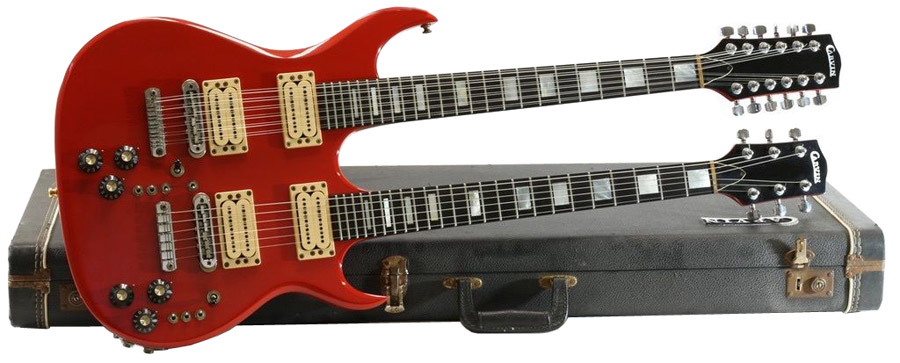
The DC160 was unchanged for 1984, but it did get a new catalog photo showing the FTB6 bridge that was introduced in 1983. The price of the DC160 remained $685, or $715 for a left-handed model. The optional Kahler Pro tremolo was an additional $190. The HC10 hardshell case was $60.
The V220 was a guitar that was ahead of it's time. It had a totally unique look, and was destined to become one of the most popular models Carvin had offered. With MTV and other music video outlets, the V220 was seen everywhere, and was made more popular by the resurgence of Jefferson Starship (now just called Starship), whose lead guitarist (and future Carvin signature model inspiration) Craig Chaquico was often seen with one of his many V220s. The body and set neck were hardrock maple, and was available in black, white, red or clear finishes. Curly (flamed) maple and koa were also offered. Electronics consisted of an M22 pickup in the neck position, and an M22SD pickup in the bridge position, with dual volume, single tone, coil splitters and a 3-way pickup selector switch. Chrome was standard on the Schaller mini M^ tuners and B6 bridge or Kahler tremolo. MOP dot inlays were standard on the 24-fret ebony fingerboard. Base price on the V220 was a very reasonable $399. With the Kahler Pro tremolo, it was $549. Koa wood was an additional $40, and curly maple was an additional $125. Gold hardware was $50. The HC19 hardshell case was $69.
The DC200 Koa got a new catalog photo, but other than that, it remained the same as 1983, including the price. The DC200 Koa came standard with chrome hardware, MOP dot inlays, stereo wiring and the same electronics of the DC160. Gold hardware was a $50 option, and abalone block inlays were a $60 option. The base price of the DC200K was $460, and the HC11 hardshell case was $60.
The DC200 was unchanged for 1984, but got a new catalog photo to show the optional Kahler Pro tremolo. Base price actually dropped $16 to $479, and was $629 with the Kahler. It was also available as the DC120 12-string guitar, which had a base price of $495.
The DC100 was unchanged - both the catalog photo and the price. The Kahler Pro tremolo was offered as an option for an additional $190. Base price of the DC100 remained at $329, and the HC10 hardshell case was $60.
Like the DC100, the DC150 was unchanged. The catalog photo was the same, as was the price. Also like the DC100, the Kahler Pro was offered for an additional $190.
The CM140 was unchanged, and with the departure of the CM130, represented the only singlecut model offered in 1984. Prices remained the same at $485, and the Kahler Pro trem was offered for an additional $190. This was the penultimate year for the CM140; 1985 would be the last year it was offered.
The SH225, made by Carvin from Hofner components, was unchanged for 1984. Standard features on this semi-hollow electric were dual M22 pickups, dual volume and tone controls, pickup selector switch, ebony fingerboard, abalone block inlays and natural finish. Also offered was the SH225S, which featured stereo wiring, and coil and phase switches. Gold hardware was an addition $50, and a black laminated pickguard could be added for $15. Base prices increased $20, to $640 for the SH225, and $690 for the SH225S. The HC18 form-fitted hardshell case was $79.
Carvin also continued the doubleneck tradition with the DN612 (6-string/12-string guitar) and DN640 (6-string guitar and 4-string bass). These
were the same as the 1983 model, and used the same catalog photos. The base price on the DN612 was $895, while the DN640 was $865. It could also be
ordered in red or white for an additional $40, or in Koa wood for an additional $80. Gold hardware was available for an additional $100. The HC15
hardshell case sold for $75.

The LB50 did get a new catalog photo, to bring it up to spec with other photos in the catalog. Prices remained the same across the board, with the exception of the LB50K (Koa) which now had a standard price of $459, versus the base price + $40 that had been listed in earlier catalogs. Same with the LB40K, which was now sold for $409.
Everything about the LB40 was the same - pricing, options, features, and even the catalog photos.